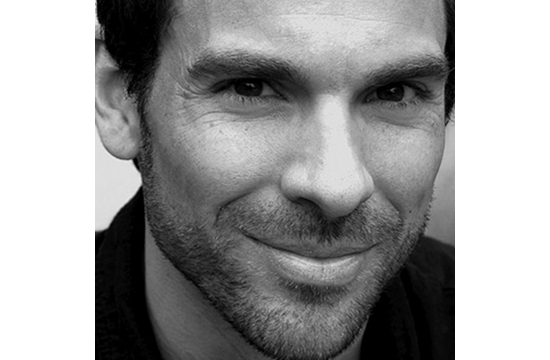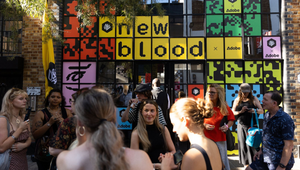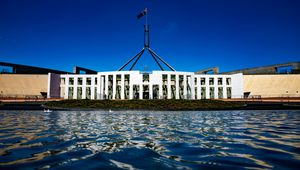
5 Minutes With… Michael Adamo

To call Michael Adamo multi-talented, is a bit of an understatement. He began university life studying science and was ready to enrol in medical school once his course was finished. Alas, his love of art left him craving something more creative, and he took an architecture course at Harvard (as you do), seeing the profession as a balance between science and creativity. That still didn't quite cut it, so he looked into animation after falling in love with a number of short films. Fast forward and his life in production has seen stints in New York, Los Angeles and, most notably, almost 10 years at Passion Pictures in London as Executive Producer and Head of New Business. Just last week he announced the launch of his own outfit, Fieldtrip. LBB’s Laura Swinton found out what Adamo’s got up his sleeve from his own baby.
LBB> So you were at Passion for 10 years and now you’ve gone off to set up Fieldtrip. Was that significant anniversary the motivation for you to move on and start something new?
MA> I guess so. Fieldtrip was really motivated by my personal desire to have a great company of my own and to create something that I could really put my stamp on. I wanted to apply everything I’d learned over the years – not just at Passion but also my previous experience in the US. It wasn't motivated by a big business plan or trends or anything like that, I just thought it was time for me to try it on my own and take on new challenges.
LBB> In terms of the current market, were you a bit wary about setting up right now or do you think there are opportunities to be had?
MA> You need to be focused, agile and specialist in what you do. I think if you can carve out that niche then there is definitely an opportunity for you. There’s no doubt that it is a difficult market because the expectations of a production company are higher than ever and budgets are lower than ever. You have to be nimble and responsive, but I think we can do that. I’m really excited about this though because Passion was a pretty big company, whereas I really like the idea of keeping Fieldtrip on the small side. Right now I have five directors and a partner, by the end of the year I’d like maybe seven and a partner.
LBB> How would you describe the founding ethos is of Fieldtrip?
MA> I’ve targeted directors who I think have a similar voice but obviously don't overlap each other. We're really going for mixed media directors – I think that's what differentiates us from companies like a Passion Pictures or a Nexus. They do mixed media projects, obviously, but that's what our whole focus it. Our directors do pure live-action and pure animation but their sweet spot is in between those things, where they converge. Projects that combine different techniques in a novel way – that’s the space that we want to inhabit.
LBB> How long did it take you to put the roster together and get everything set up?
MA> I started in early January, so about three and a half months to get the foundations in place. But we’re there now and we’ve actually produced our first job already for Saatchi & Saatchi. We did it under the radar. It was a little thing but it was something that came through contacts, you know. It went really well, it was real fun, the agency was happy and it was great to get the Fieldtrip name out there.
LBB> I see also that you've got a partnership with 1st Avenue Machine – how did that come about?
MA> I’m really excited about that because they’re a company that has a similar voice to us, with regards to directors on its roster. They have a company culture that I really admire and want to emulate at Fieldtrip. The relationship came about because, when I was at Passion, we represented them when they first got going, probably back in 2006/2007. At the time they were a small company, it was just founders Serge [Patzak] and Arvind [Palep]. We were kind of there from the start and I got to know the guys really well. We produced the Audi ‘Unboxed’ commercial together, which was a really special film. We always had a close relationship. Even when they left to go to Stink because they wanted to pursue more live-action opportunities, we remained friends. When they heard that I was leaving Passion and setting up my own company, they wanted on board, which is hugely flattering because they are such a great company. And it was a really fantastic was to kick-start Fieldtrip because as soon as the other directors saw that First Avenue Machine were on board, they were very interested to get involved.
LBB> You said earlier that the directors on your roster overlap live-action and animation –what is it about mixed media work that kind of work that you enjoy being involved in?
MA> It’s exciting to find new ways of combining techniques and venturing into unchartered territories. Every technique has to be great for it all to come together, and for me it’s always that kind of work that stands out the most. It also make the job more challenging, which is always fun. We’re not averse to doing pure live action or pure animation; it’s just enjoyable to combine the media. 2D animation can just elevate a film beyond a pure live action project.
LBB> Before you went into film, you studied science – what led you to that initially and then onto film?
MA> It definitely dumbfounded my parents when I told them that I wasn't going to continue with science and was instead going to study animation. I always liked art and I always liked science; I just happened to end up at an undergraduate university that was better at science so that’s what I decided to focus my undergraduate degree on. I actually did quite well and my parents were hoping that I would apply for medical school, but I came to realise that I just didn't have much in common with the other kids in my class. It made me think that maybe I should be doing something else. I decided to look into architecture because it seemed to probably be the best combination of art and science.
After I graduated I did an introductory program at Harvard which basically involved doing the work you would do as an undergraduate in architecture. It was during that course that I realised architecture was cool, but not the right career for me.
My advisor on that course asked me what else I was interested, and I told him about the film festivals I’d attended and short films that I’d fallen in love with. He just said “why don't you go and do that?” Until that point, it had never occurred to me that animation was a career choice for anyone. It was sort of a revelation. I spent the next half a year applying to graduate schools that did film. I finally got accepted at New York University and that was the decision made for me – I’d always wanted to live in New York, so it was just the perfect choice.
LBB> Do you think having a background in quite rigorous thinking has benefited you in your more creative career?
MA> I think it definitely has. Animation is very mathematical. You make a film a frame at a time and you have to consider timing, lighting and everything. It requires both creative and scientific skills. I guess it’s also helped be become a producer because producing a job is very scientific, mathematical and rigorous.
LBB> Obviously Passion was based in London, but why did you decided to keep Fieldtrip in London? Were you tempted to go elsewhere?
MA> I love London. I moved here about nine and a half years ago to take the job at Passion. I’ve now spent more of my career in London than I have in the States. I began my career in New York, before moving to LA, but those two stints combined are shorter than my time in London. My network is here. Also the type of advertising that comes out of London and the opportunities that it brings are just more interesting for me. It can be more creative and adventurous than some of the average work that can come out of the US. I never even pondered opening shop in the US because it just always felt right that Fieldtrip was based in London.
LBB> What are your plans for the coming year?
MA> Obviously the first plan is just to make a lot of noise and make sure that everyone knows we’re here, what we’re up to and what directors we have on board. Then obviously we need to keep those directors busy.
Once we get that going, I’m really into the idea of working with the directors to diversify what Fieldtrip does. We will be looking at more interactive projects – we’ve been speaking to a couple of interactive companies about how we can work together. There’s no reason we can’t apply the amazing talent that we have on the roster to interactive or experiential work. I think that would be really exciting and interesting for everybody that works at Fieldtrip but also for the whole industry. In my experience from going to screenings, people are always more interested in seeing a very recent experimental project than a 30-second film that was produced for an agency two months before.















